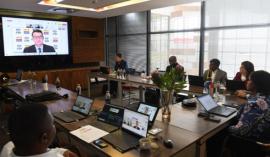
Trade, Industry and Competition Deputy Minister Andrew Whitfield says there is a need for global consensus to ensure that the new opportunities presented by the green economy result in shared prosperity.
He was leading a delegation of officials from the Department of Trade, Industry and Competition (the dtic), in briefing a joint session of the Portfolio and Select Committees on the policy priorities of South Africa’s G20 Presidency and the dtic’s role in this regard.
Tuesday's session was held ahead of the first Trade and Working Group meeting which will be held virtually later in the day.
The working group is expected to hold further meetings later in the year before the main ministerial meeting in October.
Its primary focus will be on four priority areas, namely, trade and inclusive growth, a responsive trade agenda to address global commons, green industrialisation and the reform of the World Trade Organization.
The Deputy Minister told the Parliamentarians that the G20, as a forum of the largest economies in the world, bears a unique responsibility in ensuring a response to the environmental, social and economic challenges that continue to affect stability and hamper the pursuit of sustainable development.
“A particularly worrisome prospect is the lack of multilateral solutions and cooperative approaches and widening punitive approaches to addressing the issues of global commons and the rise in risks of fragmentation of international trade in the context of the transition to cleaner energy sources.
“We need to ensure that trade and climate/environmental policies should be mutually supportive and are consistent with World Trade Organisation principles contribute to the objectives of sustainable development.
“Mobilising support and resources to tackle the internal disparities driven by the uneven distributional effects of trade and globalisation is critical,” he said.
He said investments into developing countries must move away from “pit to port” activities that promote resource extraction.
“There is a need to promote beneficiation and local value addition of resources at source resulting in an additive rather than an extractive relationship.
“This necessitates finding a requisite balance that ensures that resource-rich countries benefit greatly from their endowments and that investments that contribute to structural transformation and industrial development while there is also a flow of resources to ensure the integrity of global and regional value chains.
“By strengthening and reforming multilateral mechanisms and institutions; by deepening International economic cooperation, we can indeed realise a better world free from the twin scourges of inequality and underdevelopment,” he said. – SAnews.gov.za


